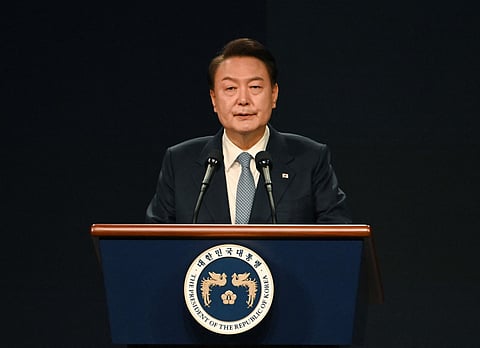

SEOUL: South Korean voters handed President Yoon Suk Yeol a stinging defeat Thursday, as his party failed to win back control of parliament, leaving him a lame duck for the remainder of his term.
Yoon becomes the first South Korean president whose party didn't have control of the legislature for at least a portion of their term, local reports say, and experts warn he'll struggle to get anything done, with gridlock, party feuding, and personal attacks set to rise.
AFP takes a look at what we know:
Since he won power by the narrowest majority in South Korean history in 2022, Yoon has been hampered by record-low approval ratings and his party's lack of control in the country's parliament.
Hopes of bringing fresh momentum to his reform plans with a victory in the legislative elections have now been dashed by his People Power Party trouncing by a resurgent opposition.
His party's election defeat means Yoon's government "will be paralysed in terms of law-making and budgeting," Yonsei university professor Chung-in Moon said.
"If Yoon shows political entrepreneurship, he can avoid the collision course with the opposition party," Moon said, adding, however, that this was not likely.
"Yoon, being a former prosecutor, is not accustomed to logrolling and muddling through. It is so because of his ideological rigidity. He will face gloomy days ahead," said Moon who was a special advisor to former president Moon Jae-in.
More political gridlock, experts say.
Without a so-called super-majority, the opposition can't override Yoon's veto -- but they can continue to significantly obstruct the president's legislative agenda.
"Political polarisation and mistrust" will make compromise near-impossible, Andrew Yeo, a politics professor at the Catholic University of America, told AFP.
Neither party will be able to "push any meaningful domestic agenda forward that can tackle high inflation, rising prices, and falling birthrates," he added.
Yoon has liberally used his presidential veto to scupper opposition bills, but now they'll likely re-introduce legislation to probe authorities' handling of the 2022 crowd crush -- and target Yoon's family.
"The opposition will try to appoint a special counselor to investigate the first lady," Gi-Wook Shin, a sociology professor at Stanford University, told AFP -- rebooting the cycle of revenge in South Korea's famously adversarial politics.
With his party's landslide win, controversial opposition leader Lee Jae-myung, who lost to Yoon in 2022, now has another shot at the top job when Yoon's term ends in 2027.
However, like former US president Donald Trump, Lee "is facing a lot of legal problems but is still a leading candidate for the next president," said Stanford's Shin.
"Korean voters will face a similar dilemma as American voters will in November. Despite his legal problems, Lee still maintains high popular support."
Despite the slew of cases against him, including corruption allegations, his party's stunning success shows that "candidates charged with crimes can still become winners in the world of South Korean politics," the Catholic University of America's Yeo said.
Another of the election's big winners was former justice minister Cho Kuk, whose newly-founded Rebuilding Korea party capitalised on discontent with the two main parties to pick up 12 seats.
Once a rising political star, Cho was tipped to run for president before an academic admissions scandal in 2019 engulfed his family -- investigated by President Yoon, then the country's top prosecutor.
After the victory, rather than announcing fresh policies, Cho vowed to introduce a bill to target the PPP's head, Han Dong-hoon -- who resigned early Thursday anyway, in response to the party's defeat.
This personal "vendetta" between the two men sums up, for many Koreans, the endless "liberal versus conservative struggle" in the country's politics, Vladimir Tikhonov, professor of Korean Studies at the University of Oslo, told AFP.
"Regardless of who ends on the top, this personalisation of politics reveals a weakness of the country's existing party system."
Seoul's political gridlock is good news for Kim Jong Un, experts say.
"Pyongyang has little reason to comment directly on election outcomes but could intensify efforts at sowing divisions in South Korean society," said Leif-Eric Easley, a professor at Ewha University in Seoul.
Kim may also be looking ahead to America's November elections, and hoping for a victory by Trump.
"We can assume that a Trump 2.0-Lee dynamic bodes well for" North Korea, Soo Kim, policy practice area lead at LMI Consulting and former CIA analyst, told AFP.
"The two leaders may work together on 'common interests,' which, ironically, won't be for protecting allied security interests -- but to each their own."